In 1975, Australia’s inaugural national women’s football team, later known as the Matildas, participated in the Asian Ladies Football Confederation (ALFC) tournament in Hong Kong.
This pioneering squad laid the foundation for women’s football in Australia, marking the nation’s first foray into international competition. In recognition of their trailblazing role, Football Australia awarded the 1975 Matildas ‘A’ International caps, numbered ‘O1’.
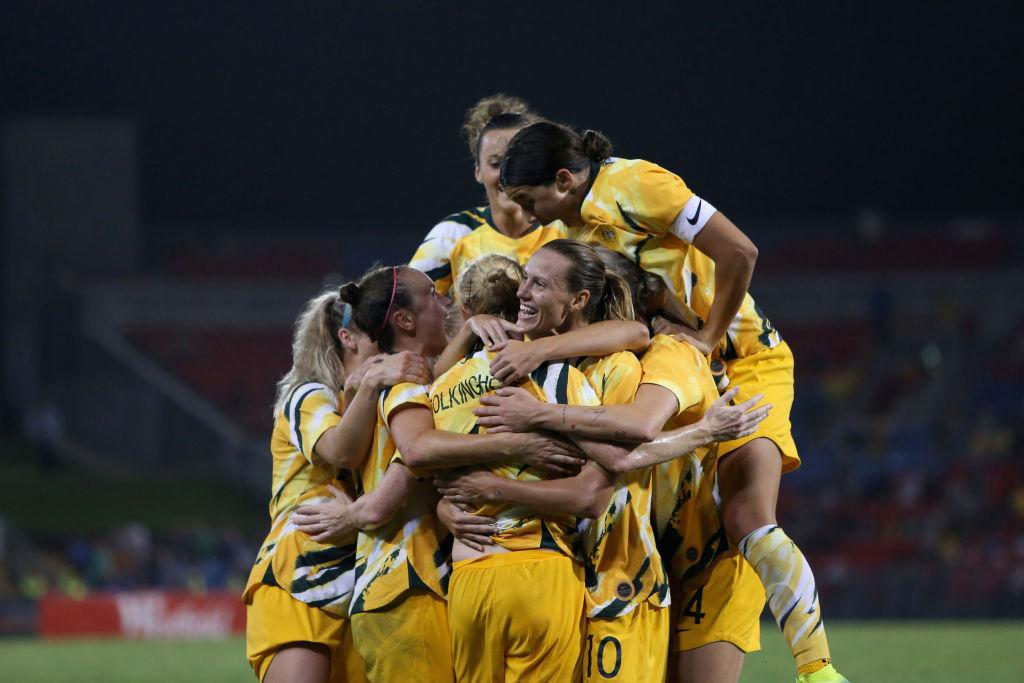
Matildas History: Recognising the First Matildas
Honouring the Pioneers of Australian Women's Football
Football Australia proudly recognises the 1975 Australian Women’s National Team as the "First Matildas," honouring their pioneering role in shaping the legacy of women’s football in Australia. This landmark recognition cements their place in history and acknowledges their contributions to the growth of the game.
A Historic Journey: The First Matildas
In 1975, Australia’s first-ever senior women’s national football team represented the country at the Asian Ladies Football Confederation (ALFC) Cup in Hong Kong. Competing against international teams in a groundbreaking tournament, these trailblazing women wore the green and gold, carried the Australian Coat of Arms, and proudly represented their nation.
Despite facing limited resources and recognition at the time, their efforts laid the foundation for the evolution of the Matildas into one of the world’s most respected women’s national teams today. Their passion, resilience, and determination paved the way for future generations.
Recognising the First Matildas with ‘A’ International Caps
After a comprehensive review process, Football Australia formally acknowledges the 1975 team with ‘A’ International caps numbered “O1” – signifying their foundational role in Australian women’s football history. This recognition mirrors the 1922 Australian Men's National Team, which is acknowledged as the First Socceroos for their pioneering role in men’s international football.
The review was conducted by a dedicated working group, chaired by Football Australia Chairman Anter Isaac, alongside Deputy Chair Jaclyn Lee-Joe and Director Spiro Pappas. They were supported by esteemed external experts, including:
- Dr. Kevin Tallec Marston – Research Fellow & Academic Project Manager, CIES - International Centre for Sports Studies
- Omar Ongaro – Former Chair, FIFA Dispute Resolution Chamber and Football Regulatory Director
This recognition was based on key criteria, including:
✅ Official Records: Matches sanctioned by football governing bodies
✅ International Games: Participation against recognised national teams
✅ Uniforms & Insignia: Wearing the green and gold with official national emblems
✅ Player Eligibility: Representing Australia at the international level
✅ Continuity: Establishing a historical link between the 1975 team and modern national teams
✅ Public Perception & Media Coverage: Acknowledgment of the team in media at the time
Football Australia’s commitment to recognising its football pioneers ensures that the First Matildas are honoured as the trailblazers of the women’s game.
The First Matildas: Australia’s 1975 Women's National Team
The following players and staff have been officially recognised with ‘A’ International Caps numbered “O1” as the First Matildas:
1975 Australian Women’s National Team
🏅 Pat O’CONNOR (Captain)
🏅 Christel ABENTHUM
🏅 Sue BINNS
🏅 Kim COATES
🏅 Julie DOLAN
🏅 Lynn EVERETT MILLER
🏅 Trudy FISCHER
🏅 Cindy HEYDON
🏅 Vickie KOHEN
🏅 Sue LARSEN
🏅 Lynn MCKENZIE (Goalkeeper)
🏅 Aunty Tarita Yvonne PETERS (Stacey Tracy) - First Indigenous Matilda
🏅 Connie SELBY
🏅 Trixie TAGG
🏅 Sue TAYLOR (Goalkeeper)
🏅 Gundega (Gundy) ZARINS
👨🏫 Coach: Joe O’CONNOR
This team forged a legacy that lives on today, inspiring generations of female footballers across Australia.
Historic Milestones & Firsts
🏆 First Australian Women's National Team Captain: Pat O’Connor
🎓 First Australian Women's National Team Coach: Joe O’Connor
🌏 First Indigenous Matilda: Aunty Tarita Yvonne Peters (Stacey Tracy)
This recognition ensures that their achievements are forever part of Australian football history.
Words from the First Matildas
Pat O’Connor, Captain of the 1975 Team, shared her pride in this long-awaited recognition:
"I am deeply honoured and thrilled by Football Australia's decision to recognise our 1975 team with ‘A’ International caps. This acknowledgment as the First Matildas not only celebrates our dedication but also cements our place in Australian football history. It is a moment of immense pride for all of us, and I am grateful for this recognition."
Looking Ahead: Preserving History & Honouring the Legacy
Football Australia is committed to ensuring that all national team representatives, past and present, are recognised and celebrated. This recognition of the First Matildas is a step towards honouring the pioneers who paved the way for today’s world-class Matildas squad.
As we celebrate the modern-day Matildas, we honour those who came before them – the 1975 pioneers who first wore the green and gold and represented Australia on the world stage.
💚💛 The Matildas' story starts with the First Matildas.
The Pioneers
Building on this legacy, the 1978 Australian women’s team competed in the Women’s World Invitational Tournament in Taipei. Selected by coach Jim Selby, the squad comprised players primarily from New South Wales and Western Australia, with Connie Byrnes serving as captain. The team’s participation furthered Australia’s presence on the international stage, exemplifying the resilience and talent that have become hallmarks of the Matildas.
Football Australia celebrates the achievements of both the 1975 and 1978 teams, acknowledging their pivotal roles in shaping the sport’s history. Their dedication and passion continue to inspire future generations of Australian women footballers.
Australia's squad for the 1978 tournament, selected by first Australian women's team coach Jim Selby, consisted of players mainly from NSW and Western Australia. Captain Connie Byrnes had the honour of captaining the first Australian senior national women’s team.
In the first round of matches Australia was missed sixth place only on goal difference. The Australians then competed in the second round for teams placed seventh to thirteenth, ultimately finishing eighth in the tournament.
Australia's results of the 1978 World Women's Invitational Tournament in Chinese Taipei: W1-0 v Austria, D1-1 v USA, L0-1 v Sweden, D0-0 v Denmark and W5-0 v Thailand. Young Australian Anna Senjuschenko (who tragically died in a car accident in 1979 aged 17) was voted a star player of the tournament by the media, while Connie Byrnes was awarded ‘Miss Football’ for Australia.
The women’s team played on sporadic occasions throughout the 1980s, with only a limited number of major international competitions enticing much attention to the team.
The introduction of the FIFA Women’s World Cup and women’s football at the Olympic Games in the 1990s, combined with a surge in participation levels throughout the country, sparked renewed interest in the national women’s team, now called the Commonwealth Bank Matildas.
World Cups
After barely being beaten out of a place at the inaugural FIFA Women’s World Cup in China in 1991 on goal difference (by New Zealand in the Oceania qualifiers), the Australian women’s national team has never failed to qualify for the World Cup, finishing as top team in Oceania in the 1995, 1999 and 2003 Oceania World Cup qualifiers.
The Commonwealth Bank Matildas qualified for the 2007 finals via Asia for the first time, after reaching the final of the 2006 AFC Asian Women’s Championship in Adelaide. Australia qualified for the following year’s World Cup after defeating Japan in the semi-final 2-0 (top three nations in the tournament qualified for the World Cup); the final however saw the Commonwealth Bank Matildas go down to China only after a penalty shoot-out, to finish runners-up in the tournament. The Aussies went that one better in a memorable 2010 AFC Asian Women’s Cup in China, defeating the highly-fancied Korea DPR side on penalties in the final following a 1-1 scoreline after 120 minutes of play and earning the country another shot at the World Cup.
Australia appeared to gradually learn and improve throughout each of its first few World Cup forays, as the aggregate goal differences over each World Cup shows: a goals for-and-against record of 3-13 (minus 10) in its 1995 World Cup matches reduced to minus 4 in 1999, and went down to minus 2 in the 2003 campaign. By the 2007 tournament, a positive goal difference over the four matches, which included Australia’s first World Cup finals win (4-1 over Ghana) and quarter-final appearance (a 2-3 loss to Brazil) displayed how far the Aussie women’s team had come over the previous 12 years. Further testament to the team was provided when coach Tom Sermanni was named 2007 AFC Coach of the Year.
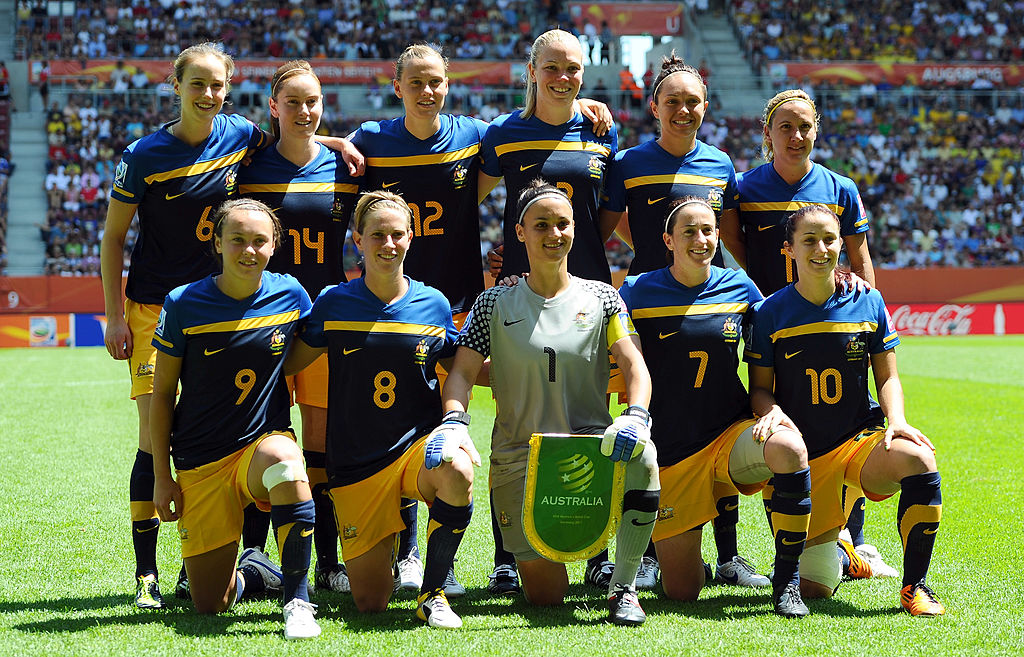
In 2011 Australia put in arguably their best FIFA Women’s World Cup performance to date with a strong showing in Group D where the team came out of the group with six points following wins against Equatorial Guinea and Norway as well as a narrow 1-nil loss to Brazil. In a tournament where Australia had the third youngest team, with an average age of 22, the team performed strongly and received many plaudits for their style of play and character. Australia were knocked out in the quarter final by eventual third-placed Sweden, losing 3-1 to the world’s fifth ranked nation.
2015 saw Australia start their FIFA Women's World Cup campaign against eventual winners the United States in their opening Group D clash. Playing some scintillating football, the Commonwealth Bank Matildas pushed the Americans all the way before losing 3-1.
Next up was Nigeria, and a Kyah Simon double was enough to earn Australia a crucial 2-0 win, setting up a clash with Sweden, the side that had knocked them out four years earlier. Despite a 1-1 draw Australia finished second in their group and would face an imposing Brazil side in the Round of 16.
That match in Moncton would go on to become part of Australian football folklore, as the Commonwealth Bank Matildas shocked the more-fancied Brazilians. Another Kyah Simon goal, this time in the 80th minute, sealed a memorable result.
A quarter-final against eventual runners-up Japan would prove a bridge too far, with the Green and Gold going down 1-0 in Edmonton.
Drawn in Group C, the CommBank Matildas began their FIFA Women's World Cup 2019 against the fast-improving Italy. It was a bright start for Australia as captain Sam Kerr opened her FIFA Women's World Cup account with a penalty conversion in the first half. However, it wasn't enough for victory as the Italians recorded a late winner to take the three points.
A familiar opponent was next for Australia as, for the fifth major tournament in a row, they were to met Brazil. It was a match befitting the rivalry built between the two nations with the Commonwealth Bank Matildas coming back from a 2-0 deficit to claim a famous 3-2 victory in Montpellier.
A superstar prior to the tournament, Kerr made Australian history in the final group match against Jamaica. The prolific striker netted all of Australia's goals, becoming the first Aussie to score a FIFA World Cup hattrick, in their 4-1 win over the Reggae Girlz to set up a Round of 16 clash with Norway.
After Norway took a first half lead in the Round of 16 encounter, Australia worked their way into the match and put pressure on the Norwegians. That pressure finally told in the second half with Elise Kellond-Knight scoring straight from a corner to bring the Commonwealth Bank Matildas level. A back and forth struggle resulted in penalties with Australia ending their tournament in Nice.
The 2023 edition of the tournament was one to remember and will go down in history for the CommBank Matildas. The team hosted the tournament, alongside New Zealand, and hosted the most successful tournament to date.
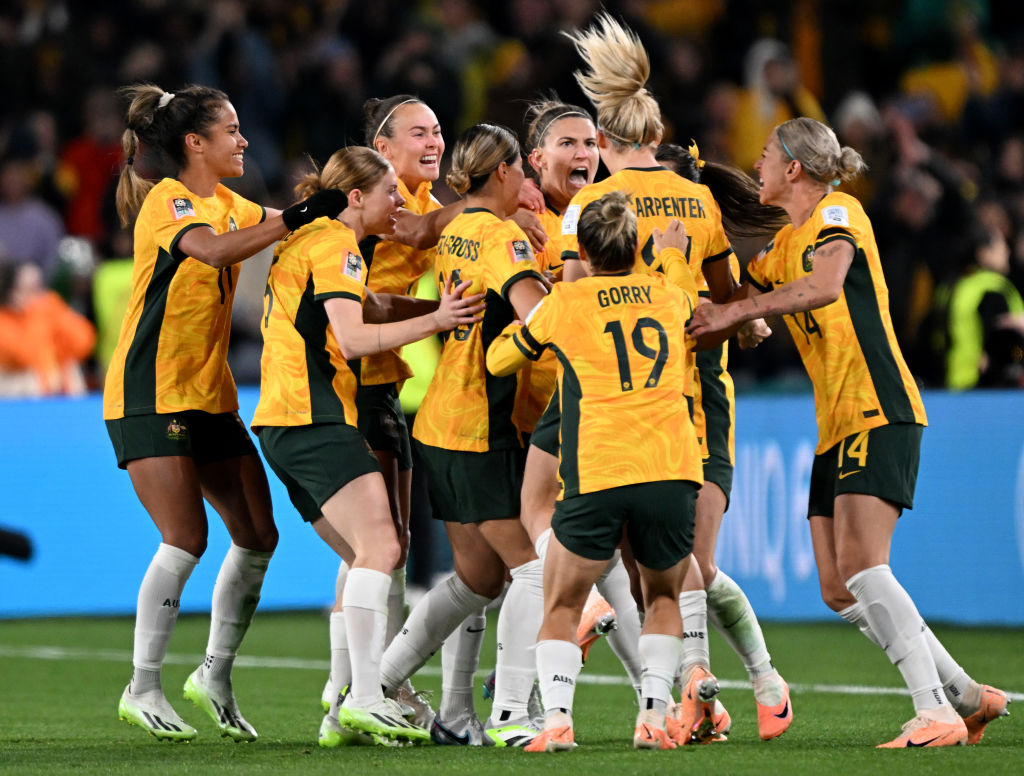
Australia's opening game of the tournament saw them take on debutants the Republic of Ireland in front of 75,784 fans at a raucous Stadium Australia. Steph Catley’s second-half penalty was the difference as Australia held on in a nervy last 20 minutes for the win.
The team then travelled to Brisbane to take on Nigeria, a familiar foe in the tournament, facing them back in the 2015 edition of the tournament. Still without skipper, and Australia's leading goal-scorer, Sam Kerr, the side had to perform against some powerhouses of women's football.
The CommBank Matildas suffered defeat in their second group stage game at the FIFA Women’s World Cup, falling to Nigeria 3-2.
After a defeat in the second group stage game, it was do-or-die for Australia in their final group stage game, and in their way was the defending Olympic Champions, Canada.
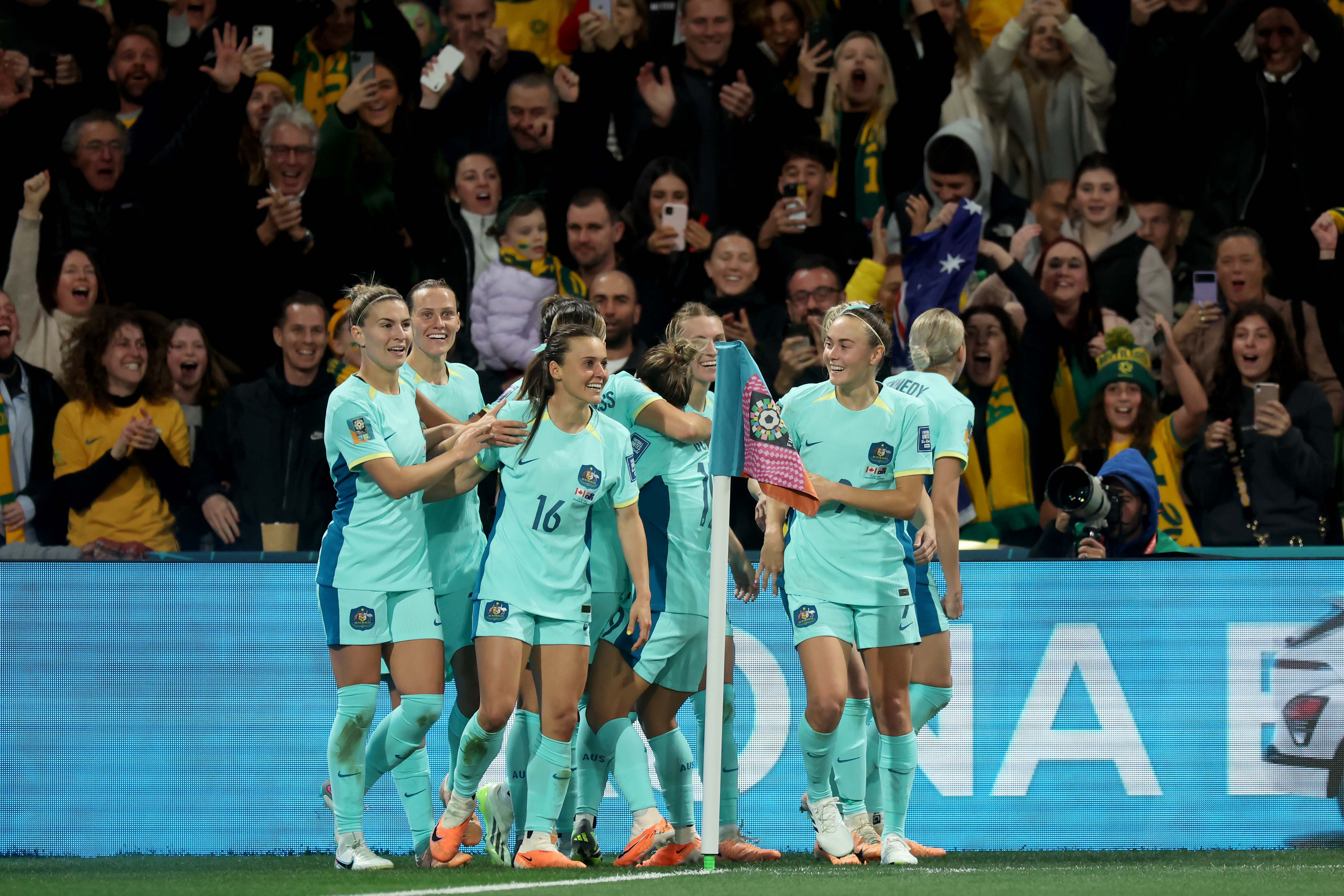
A first-half brace to Hayley Raso and goals to Mary Fowler and Steph Catley in front of a packed out stadium in Melbourne ensured the 4-0 victory, a night to remember in Victoria as the CommBank Matildas topped Group B and moved on to the knockout stages.
It was back to Sydney for the Round of 16 game, with Australia locked in to play Denmark for a place in the quarter-finals. Goals to Caitlin Foord and Hayley Raso on either side of the half-time break were decisive in front of 75,784 raucous fans at Stadium Australia.
The game saw the return of Sam Kerr from injury, with the striker coming off the bench late in the game to a warm reception from the home crowd who was waiting for a first glimpse at the skipper on home soil.
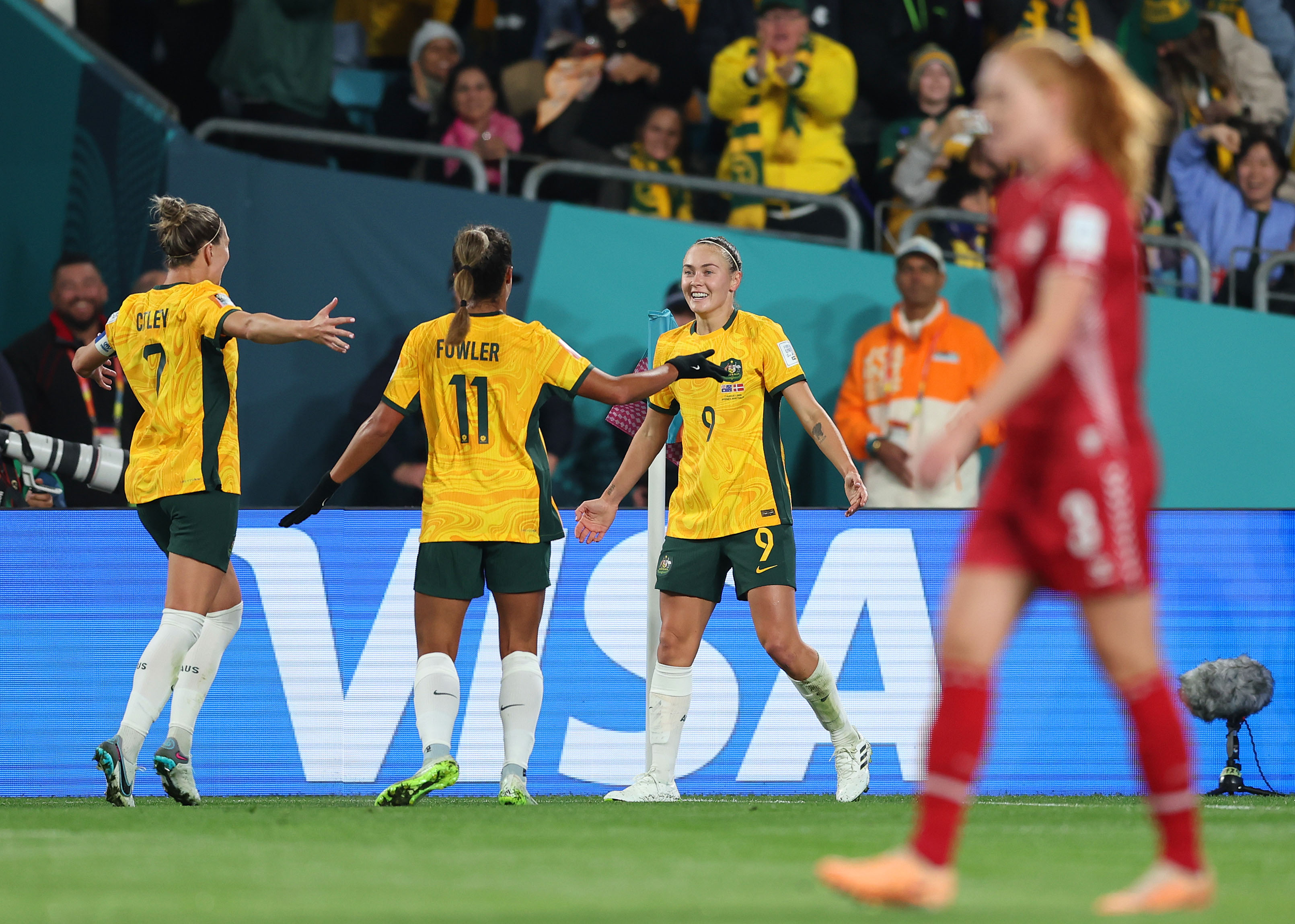
After advancing past Denmark is was back to Brisbane for the team, who faced the 2019 hosts of the tournament, France for a place in the semi-final. It was a fitting match-up, with the two sides going head-to-head just two weeks prior in Australia's final game on home soil before the tournament kicked off.
The teams could not be separated after 120 minutes. Despite multiple opportunities, it remained scoreless. A penalty shootout for the ages was required – including saves, re-takes, missed opportunities, drama. Substitute Cortnee Vine was the one who converted and Australia made history.
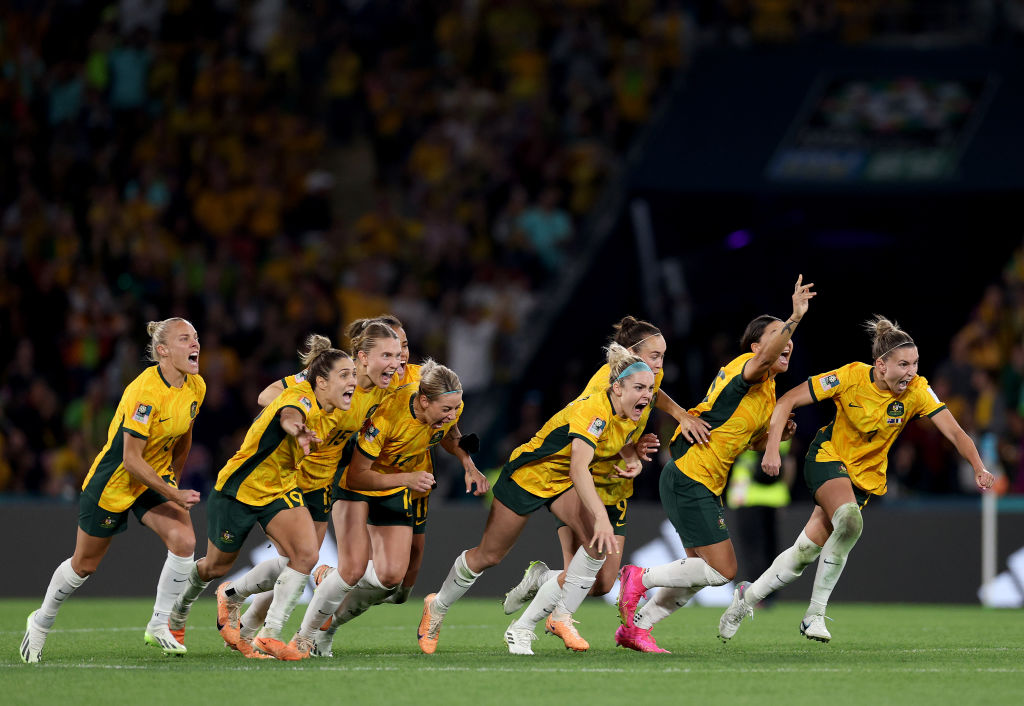
The CommBank Matildas booked their spot in a first-ever FIFA Women’s World Cup™ semi-final after a dramatic penalty shootout victory over France, with wild scenes in Brisbane following the full-time whistle.
With a spot in the final up for grabs, England, stood in Australia's way, as the reigning UEFA European Champions looked to upset the home fans and book their spot in a second consecutive final in a major tournament.
Ella Toone gave the visitors the early lead in the first half, with work to do for the home team going into the second stanza. So, Sam Kerr decided to take matters into her own hands. In the 63rd minute, with no one around her in support, she unleashed a howitzer from well outside the area. It nestled into the back of the net for the equaliser, proving – not that Australia had any doubt - why she is considered by many to be one of the best players in the world.

After jubilation from Kerr's goal, the Lionesses took back the reigns on the game and scored two goals to record a 3-1 win over Australia and book their spot in the final and breaking Australian hearts in the process.
Australia then travelled back to Brisbane with a short turnaround until their third-place playoff against Sweden, with a medal on the line but both teams starting to feel the effect of the tournament.
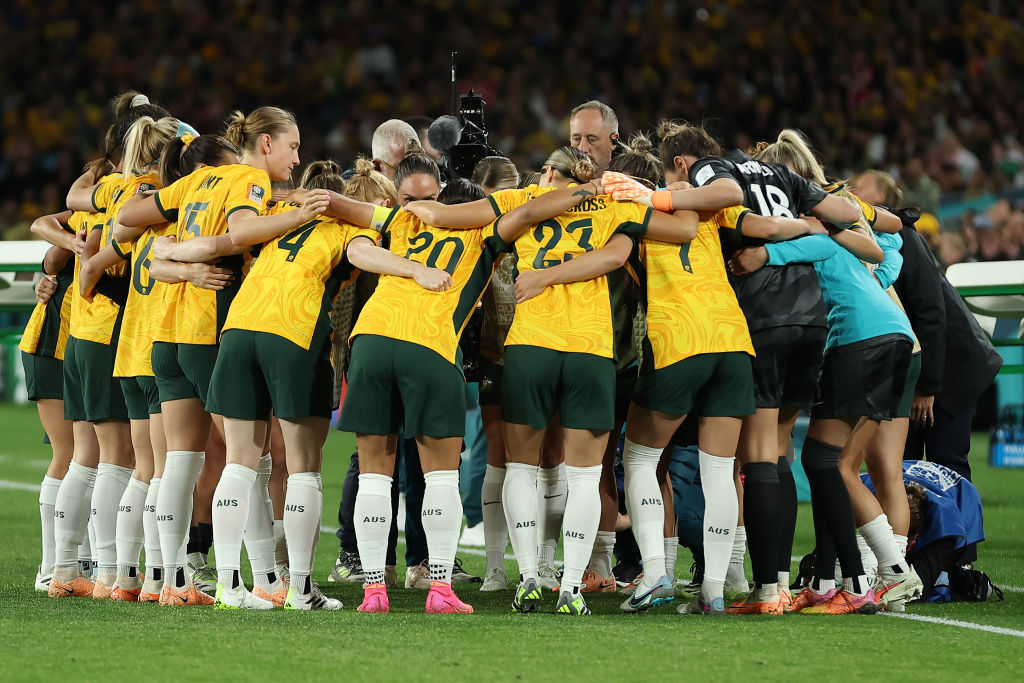
The CommBank Matildas have fallen 2-0 to Sweden in the third-place playoff. Sweden won their fourth-ever bronze medal at a FIFA Women’s World Cup™ in front of a sold-out Brisbane Stadium.
Olympic Games
Women’s football was introduced to the Olympic Games for the 1996 tournament, where only the top eight teams of the 1995 World Cup qualified (Australia had finished 12th in the 1995 World Cup).
The Australian women’s team qualified for the Olympic Games finals tournaments in 2000 (as host nation), and again in 2004 as winner of the Oceania qualifying tournament, where Papua New Guinea and Fiji stood in the way of direct qualification.
Following Australia’s entry into the Asian Football Confederation (AFC) in 2006, qualification for the Olympic Games was made much more challenging, especially for the Beijing 2008 Games where hosts and AFC member China were granted an automatic spot.
This meant only two more Olympic Games spots were available for the entire continent, Australia eventually finishing second behind winners DPR (North) Korea who gained the qualification spot from Group B.
Similar to the improvement shown over its first few World Cups, the Australian women’s team commenced its Olympic Games experience modestly, losing two and drawing one at Sydney 2000, before improving markedly in the 2004 tournament, where a 1-0 win over host nation Greece and a 1-1 draw with powerhouses USA enabled the Aussies to reach the quarter-final stage for the first time in a major women's international tournament.
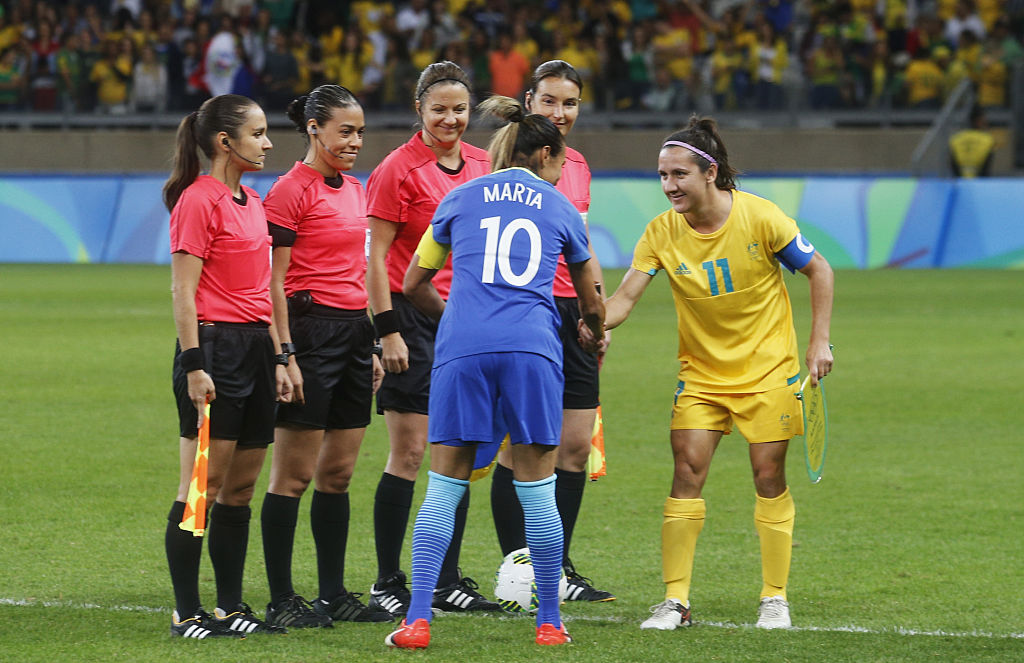
After a 12-year absence, Australia returned to the Olympic Games football tournament at Rio 2016, qualifying by topping their group.
After a 2-0 loss to Canada and a 2-2 draw with Germany, the Matildas triumphed 6-1 over Zimbabwe in their final Group F match to qualify for the knockout stages.
The Aussies would again come face-to-face with Brazil in a high-octane quarter-final. Unfortunately for the Green and Gold it would not end the same way as a year previously in the World Cup, with the hosts triumphing 7-6 on penalties after a scoreless match.
In 2020 Commonwealth Bank Matildas commenced their quest for a fourth Olympics appearance at home when the AFC Women's Olympic Qualifiers came to Sydney. Drawn in Group B, Australia opened their group stage with a 7-0 win over Chinese Taipei with Caitlin Foord netting a hattrick.
Another hattrick, this time from Emily van Egmond, saw Australia move past Thailand 6-0 in the second match setting up a group decider with China. The two continential powers went head to head in an absorbing encounter at Bankwest Stadium. After the Steel Roses went ahead 1-0 late in the piece, Van Egmond proved the hero with a 92nd equaliser to keep the Commonwealth Bank Matildas top of Group B.
Winning the group set up a home and away clash with Vietnam for a place at Tokyo. Held in Newcastle, the home leg saw captain Kerr's brace lead Australia to a comfortable 5-0 win. On the road the Commonwealth Bank Matildas came away with a 2-1 victory and a well earned qualification for the Tokyo Olympics.
The Tokyo Olympics were one to remember for Australia, achieving their best ever finish at the tournament of fourth place, however, falling just short of a place on the podium.
Australia's tournament kicked off against their Trans-Tasman rivals, New Zealand, with goals to Tameka Yallop and Sam Kerr ensuring a 2-1 win over the Football Ferns and a win to kick off the group stage.
The side then took on the familiar foe in Sweden, with an end-to-end game ending 4-2 to Sweden, with a brace to Sam Kerr unable to help Australia resurrect any points.
With a spot in the knockout stage almost in reach, they took on the reigning FIFA Women's World Cup 2019 Champions, USA, and recorded a 0-0 draw with both teams going through to the knockout stages.
Australia then took on Great Britain, perhaps the game of the tournament, Alanna Kennedy gave Australia the lead heading into the break after finding the back of the net from a corner.
Ellen White quickly turned the game on its head, scoring a quick-fire brace to see Great Britain up 2-1 in the dying stages. With the game on the line, up stepped Sam Kerr to ensure Australia wouldn't be sent packing just yet, scoring an 89th-minute equaliser to send the game into extra time.
A dramatic few minutes opened the extra time period with Great Britain awarded a controversial penalty. Teagan Micah was superb all night and again saved the day for the Australians as she thwarted the strike from Caroline Weir to keep the scores locked at 2-2.
Australia then went up the other end and took back the lead, with Mary Fowler's 20-yard strike giving Australia a 3-2 advantage. Within touching distance of the semi-finals, Kerr met Yallop’s cross with a perfectly-timed header which brushed the underside of the bar on its way into the net - 4-2 to the Matildas, booking their spot in the semi-finals for the first time.
The side then took on Sweden in the semi-finals, playing them only seven days after the two sides had met in the group stage. Although the group stage was a goal-fest, this semi-final game was anything but.
Australia had looked to take the lead early in the game, however, Kerr's goal was called back for a foul in the lead-up. It was Sweden's Fridolina Rolfö who scored the lone goal of the game, finding the matchwinner in the opening minute of the second half.
The Matildas would have to battle it out for bronze with the USA, and what a battle it was, ending 4-3 in favour of the USA, with Australia falling just short of a medal.
Sam Kerr, Caitlin Foord and Emily Gielnik all found the back of the net for Australia, but it was USA's veterans that helped them to a medal, with Megan Rapinoe and Carli Llyod each notching braces.
Australia qualified for the Paris 2024 Olympic Games after recording victories over IR Iran, the Philippines, and Chinese Taipei and a home-and-away win over Uzbekistan to book their spot in another Olympics.
Australia's opening game of the tournament saw them beaten 3-0 by Germany, who went on to win bronze at the tournament.
The second game of the group stage was a must-win if Australia was to have any chance of advancing to the knockout stages. The game was frantic to say the least, Zambia's Barbra Banda opened the scoring just one minute into the encounter.
Alanna Kennedy found the equaliser in the 7th minute, becoming the first Aussie to score at 3 Olympics. However, Zambia went down the other end and scored two goals in quick succession.
Hayley Raso then clawed back a goal to make it 3-2. The African side then took the lead for the third time in the game just before the half-time break, with Banda completing her hat-trick to make it 4-2.
End-to-end drama continued in the second half, with Zambia making it 5 just after the break, then an own goal from Zambia saw Australia claw one back to make it 5-3.
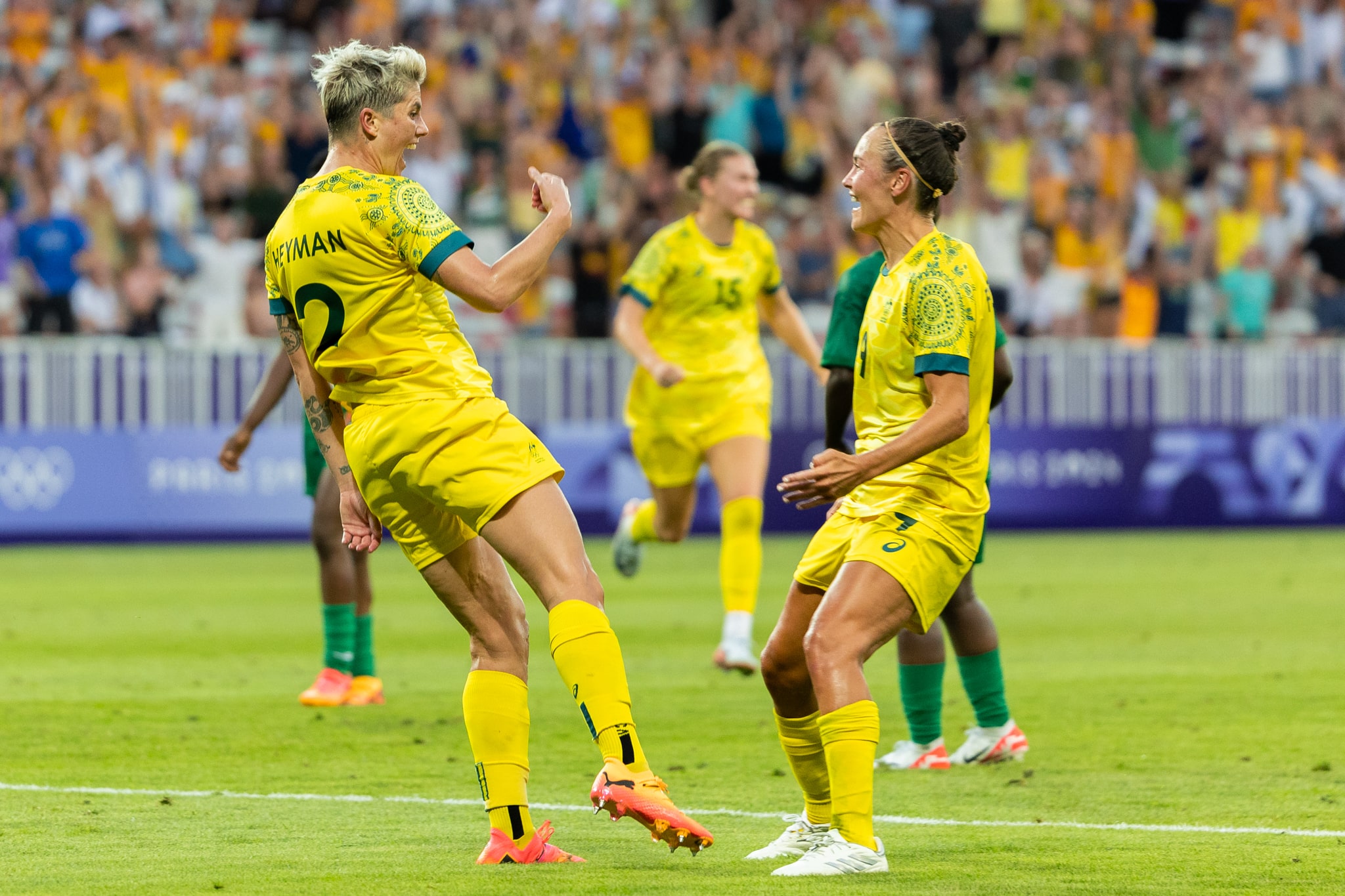
A brace to Steph Catley and a 90th-minute matchwinner to Michelle Heyman saw the game end 6-5 in favour of the Australians.
Going into the final game the side was up against the USA, a replay of the 2020 Bronze medal match. With USA having already booked their spot in the knockout stage before the game even begun, all the pressure was on the Australians.
Australia did well to defend the onslaught in the first half, but were finally breached in the final minutes of the first half. USA doubled their lead in the second half, and with a spot in the knockout stages slowly slipping away, Alanna Kennedy gave Australia a glimmer of hope with a goal in the 92nd minute.
The game ended 2-1, but the team was waiting in baited breath for the other results to filter through to see if they would finish as one of the best third-place teams. Unfortunately, Colombia was unable to upset the reigning gold medal winners, Canada, which meant Australia missed out on finishing as one of the best third-place finishers on goal difference.
